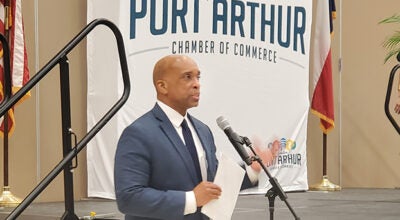Councilman explains why he wants to reduce size of PA Council
Published 1:30 pm Saturday, October 15, 2016
Osman Swati, District 6 Port Arthur City Councilman, said there has always been widespread concern with citizens for some time now there are too many council member on the city council.
He said that served as the motivation for him to place on the November 8 General Election ballot to amend the city charter and remove Districts 5 and 6 and reduce the size of the Port Arthur City Council.
“This concern arises by comparing Port Arthur with other cities our size,” he said. “It is also seen as an approach to reduce municipal spending on an unnecessary number of council members.”
One can do a quick analysis, Swati said, of other cities in Texas the size of Port Arthur and the number of council members on their councils:
Beaumont 118,000 Seven members including the mayor
Baytown 75,000 Seven members
Grapevine 51,000 Seven members
Galveston 50,000 Seven members
De Soto 52,000 Seven members
Euless 54,000 Seven members
Pflugerville 57,000 Six members
Rowlett 60,000 Seven members
San Marcos 51,000 Seven members
Mansfield 65,000 Seven members
Harlingen 65,000 Six members
Cedar Park 66,000 Seven members
Conroe 68,000 Six members
Swati said his research to remove Districts 5 and 6 was triggered when the civic group United Citizens Of Port Arthur circulated a petition to get rid of At-Large Positions 7 and 8 from the city council and placed on the November ballot. That petition failed due to not enough signatures in the time allotted to gather them.
“Other cities looked at, like 10 to 15 cities with the same population who had seven or less council members. We need to reduce our number of council members, but how?” he said.
The Port Arthur City Council is structured the way it is due to a 1981 case of the city versus the federal government.
“In the 1981 U.S. District Court case, City of Port Arthur v. U.S. Justice Department, after expanding its territories the city had failed to adopt an election plan that would not deny or abridge the right to vote on account of race, color or membership in a minority group,” he said.
“Our current form of council was brought in place as a result of that case — four single member districts, two overlapping districts and two at-large positions with one mayor. At the time this was to ensure that minority groups had sufficient representation according to their population.”
Swati said prior to the court’s decision, African Americans couldn’t get elected though they composed 30 percent of the population then. They were also restricted to one area of the city — Districts 1 and 4.
Thirty-five years later things have completely changed.
The council is composed of 75 percent African Americans and according to the 2010 Census African Americans are spread throughout the city.
There has also been a drastic rise in the Hispanic population the past 35 years with 29 percent of the city of Port Arthur (see attached sidebar for Census figures).
“The 1980 Census numbers used in the case have completely changed. There is now diversity all over the city,” he said. “Therefore considering all these extreme changes in demographics and migration of races from certain areas, of the city to others, one can safely conclude that the current structure of council is not harmonized with its population and could definitely use some updating.”
To Swati, the structure of the city council needs to change by preserving the underlying objective to implement an election plan that will not hinder any voters’ rights or specific race within the city.
A voter, furthermore, should be entitled to vote for a majority of the council.
With the current structure, every voter can vote for the council in their district, one council member in the combined district, two at-large council members and a mayor, five out of nine council members.
Swati said he was never in favor of getting rid of Positions 7 and 8 because they are at-large seats and they represent the entire city and all races of the city. That would take the city back to the way things were before 1981.
Those in favor of removing Positions 7 and 8 argued it would save the city money by eliminating them. Swati countered any two council seats removed would save the same amount of money because the election costs are the same for any council seat.
The proponents for eliminating Positions 7 and 8 also say there’s a probability of a run-off election for at-large seats and cost the city money that way. Swati believes the notion of having a run-off election is possible for any council position.
“Aside from all these arguments put forward the most striking result of such a proposal was the effect it would have on the voter’s opportunity to obtain representation equivalent to its political strength,” he said.
If the two at-large positions are eliminated, a voter will only be directly represent by a single member district and overlapping district member and a mayor. That would be three out of seven.
“How can one argue that such an approach will preserve the voter’s entitlement to be able to vote for majority of the council?” he asked. “A representative body for the citizens should not have the effect of denying or abridging the right to vote on account of race, color or membership in a minority group.”
“Any election plan must provide minority community representation proportionate to its electoral strength.”
He added that’s it’s a “serious, serious” proposal to take away a citizen’s right to vote for a majority.
Swati then laid out his reasoning why he thinks ridding Districts 5 and 6 are the best approach for the city.
He said Districts 5 and 6 comprises Districts 1 and 4 combined and District 2 and 3 combined respectively.
“Since both of these districts consist of other districts represented by their respective council members, what would be the purpose of duplicating representation by having two council members each only representing half of the city?” he said. “This was put in place in 1981 because of the significant changes in demographics of the city when the city enlarged its territory altering the racial composition of the city and hence, diluting the voting strength of one race over another. That factor does not exist any longer.”
Swati said by his proposal, every voter will have a right to vote for a member from their district of residency, two at-large council members and a mayor — four out of seven that maintains a majority.
The only cities in the State of Texas who have overlapping districts are Port Arthur and Victoria.
At the conclusion of his presentation of his proposal, Swati said he did not at any point consider what council members are elected to which council positions.
“Such an observation would be a conflict on my part as I myself am elected to this council,” he said. “My proposal, should it pass, will eliminated the position I was elected to hence there cannot be any argument of malfeasance on my part.”
“My research, analysis, and conclusion was not focused or based around the betterment of may political career. In fact, it was only for the betterment of the citizens within our city, spending of tax dollars and an improved city government.”
Some of the criticism directed at Swati from other council members during council meetings is his proposal is not citizen-initiated as the petition circulated to eliminate Positions 7 and 8.
Swati said his proposal is citizens-initiated.
“I didn’t take it to the general public but the council voted on it and approved it. The result is it addresses the citizens’ concerns,” he said. “Theirs was not citizen-initiated because there was not enough signatures. The citizens of Port Arthur don’t care which seats we get rid of. For council, this will satisfy their balance (eliminating Districts 5 and 6).”
He added that he wished the city charter was changed through a charter committee instead.
“I’m not in favor of doing it this way (placing the measure on the November 8 General Election ballot). I’m confident it will pass in November. It’s what the people want. Forcing something on the citizens is not the way. This is not forcing.”
Willie “Bae” Lewis Jr., Distirct 5 councilman, said at a city council meeting District 5 will never pass Swati’s proposal.
Swati replied it’s “nonsense” District 5 will not pass it because he has spoken with residents who live there as well as Districts 1 and 4 residents who told him as long as the number of council seats are reduced they support it.
Swati added that his training in the United Kingdom as a barrister, or attorney, helped him research this matter.
“I’ve been blessed by the grace of the Almighty before all of this and that will continue. I’m not making this (city council) a career. This is my service. My input. That’s why I jumped on board.” he said. “That my proposal is from one person versus hundreds in the city (the UCOPA petition) doesn’t mean anything to me. Everyone wants to reduce the number. I have confidence in my proposal.”
David Ball: 409-721-2427





